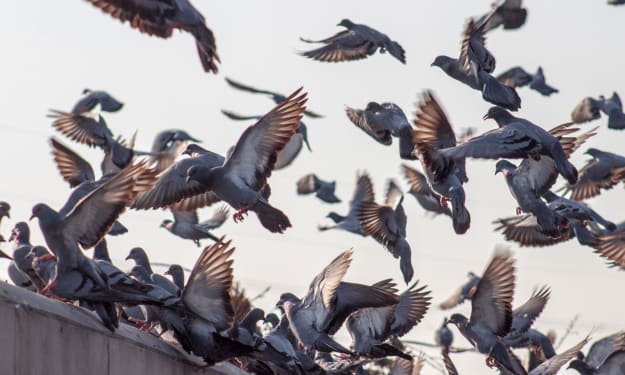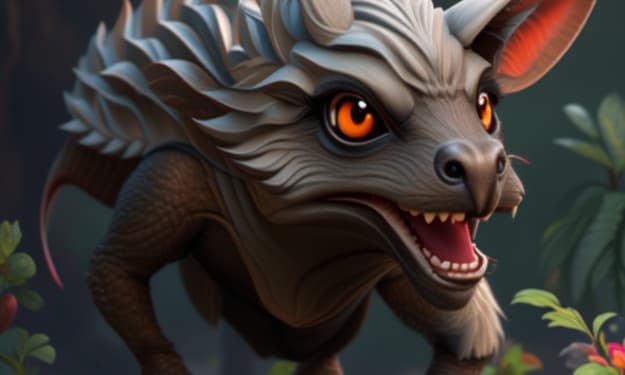
I spend the morning hours beheading the blue tulips. The phosphorescent flowers crept into the garden overnight, their heads glinting the same way bad ham starts to glint. If you don’t like the idea of bad ham, picture an oil spill, slick and wet with rain -- every rainbow color encapsulated, every hue of the spectrum on display. Their color is their death sentence. As soon as I saw them, I clamored out of the kitchen with a ‘No, oh no’. I was halfway through cracking eggs to make breakfast, but rushed outside with a pair of meat scissors to slice through their fleshy stems. I hitched my apron and skirts up past my knees, dug my feet into the earth, and
cut,
cut,
cut.
They are a gift I cannot accept. I cannot simply dig them out of the garden, or yank them up like weeds -- there is an etiquette to these things, and I am being watched. The color is unmistakable, as dangerous as the bad meat or the oil spill. It could spread phosphorescent blueness into the rest of our property and even make it down to the village if I don’t act quickly. I snip, and the stems shrivel and flop onto the carpet of upturned earth. They look so pathetic there, dead and heaving their last breaths in the dirt. I jerk them out by the bulb once their heads are detached, and then add the bulbs to a basket. I will have to go out into the woods later, deep into the woods, to bury them.
“Hey Auntie,” comes a voice from inside the house. Oh, great. Talula is awake. She totters out of the house, holding a chubby hand to her soft brown eyes in confusion at the sight of all the color, so much color. Her natural hair forms a sunny chestnut halo around her head, which is still too big for her toddler body. Her mouth flops open as she sees me with dirt up to my ankles, still barefoot, cutting & yanking & cursing at the tulips.
“Go back inside,” I say, “Auntie is just cleaning up.”
Her soft brown eyes get even bigger, “I want to help!” she says. I understand her fascination. I also understand that I have to crush it.
“Go get your mom,” I say. “She can finish breakfast this morning. Hot eggs and maybe some pancakes. Would you like that? You can have all the syrup you want. Go back inside.”
She debates. The thought of syrup is enticing. Then again, she has never seen flowers like these, that seem to breathe through the earth, that emit something like a sigh when I chop them in half. Her world is made of fabric of grays and blues and browns -- natural colors, colors that won’t attract unwanted attention. Even blood, when it comes with careless play, is hurried into dried cakes of brown on her little knees or knuckles. Color like this is a death sentence to more than just the flowers.
“I want to help,” she says again, less convincingly. It sounds a bit as if she may be experiencing her first twinges of fear. Good. It would do her good to be afraid of these tulips -- goodness knows the children who don’t fear the phosphorescent darkness end up in all sorts of predicaments.
The leaves rustle just beyond the border of our land. The salt I sowed into the earth is still within the soil, and yet -- the leaves rustle. Shadow, long and lean and blue, creeps down as the sun slips behind a cloud.
“Get inside, Talula,” I say. “Now.”
Her eyes widen and she mutters little nothings to herself as she totters away. She can complain all she wants; she can curse me to the high heavens as long as she gets inside, where it is safe. If I could finish chopping the flowers -- if I could just finish in time, before whoever is in the tree line breaks through --
“Hello, Aria.”
My hands still to a silence: I think of birds, sling-shotted down from their nests. I think of rabbits, freshly dead, their screams remaining in their throat. I think of the guts of the animals spilling out, the guts the bell-tower witches use to read the future. Silence pools into the air as her raspy voice finishes lilting my name, the way it was meant to be said, but never by one of her kind.
Silence
Silence.
Silence.
“...are you going to ignore me, Aria?”
She sounds amused. With a shaking hand, I reach for the iron meat scissors. One finger in the metal loop, then the other. Easy as chopsticks. Snip, snip.
Remember your lessons, Aria, I pray to myself -- Remember all that mother taught you, and maybe you’ll get out of this alive. Thank God Talula made it to the house. She is safe as long as she is inside. You can talk. You can even scream. But God above, whatever you do, do not sing.
I look up slowly and steadily, but I don’t trust myself to stand yet. The horned woman stands tall and lean, with stringy blonde hair that falls in tangles around her face. Her face -- I could not describe it as pretty. Ferocious, yes. Catlike in its build and intensity, yes. And monsters like her have a certain sacred beauty, the kind of beauty that never rots, never ages. But pretty…? No. Never.
With a tilt of her head, she looks at my murder of the flowers. I cannot tell if the flecks on her face are freckles or smattering of dirt. She looks like she slept in a bed of moss. Her clothes are filthy; she wears a high-collared shirt that may have once been white, but is now stained green and yellow and a gray that reminds me of lake water. Her cropped riding pants are tight to her skinny legs, and end in shreds. Her feet are bare and caked in mud.
I try not to look at the horns themselves. I fail. They are most similar to a buck’s horns -- wide, and white, and sharp at the ends. They are decorated with little golden caps and chains, which are tangled, rusted, and punctuated with feathers. After failing at ignoring her horns, I try to stare at them, to remind myself of what she is: a monster.
Not pretty.
Definitely not pretty.
Deadly.
I fail at staring at the horns, too, and get caught in her dark gaze. She raises an eyebrow, parts her mouth in a sly grin, imitating human fascination.
“Well, well,” she murmurs, staring at me down over her long, thin nose, “You did not like my gift…?” She sticks out one foot, kicks one of the dead flowers.
“There is salt in the earth surrounding this property,” I say, finally finding the strength to stand. I gather the remaining flowers into my basket. I keep my hand in the loops of the scissors, a threat, as I continue, “I am just surprised anything managed to grow, at all.”
“Eh, I don’t know about that. Salt sows its own teeth, in the spring,” she says, smiling brilliantly. This is not a person, I remind myself. She clearly has had no practice in keeping her smiles polite, her hair clean, her nails out of the dirt.
I feel a sudden stab of something I don’t expect: envy. I don’t understand it, but in my struggle to recover from it, she pounces. Her smile becomes coy as her eyes harden:
“And you, Aria, what do you sow in the spring? There have been rumors in the whisper grass, beyond your tiny village. There have been stories of stories of stories, of a girl who looks human… but she can sing and heal the sick -- a girl who can sing and shatter bone.”
“Yes, that sounds quite unusual,” I say, struggling to speak through the sudden dry patch in my throat. “I wish you all the best of luck in finding her. However, I do have responsibilities and a life to return to. So if you don’t mind -- “
“Oh, I do mind, quite a bit,” she says, her voice becoming molten and honeyed.
I force myself to think past the honey. I think of amber. I think of insects trapped in amber, stuck, dead, preserved forever. This is a creature who does not have to hide what she is. This is a creature who can walk in the sun, can wade in the creeks naked, can wrap in her arms unsuspecting waifs from neighboring villages --
“I would like to offer you protection,” the creature says. She tilts her head the other way. I wonder how much the horns weigh. I wonder what they would feel like, against my fingertips, against my palm. I wonder how those horns would feel to brush against my lips, to kiss.
I swallow hard. “I appreciate your offer but must decline,” I say carefully.
etiquette
etiquette
etiquette
“A girl with a voice like yours needs to be looked after, Aria,” the creature says, eyes flashing a warning clear as lightning. I don’t have to imagine amber anymore; I am staring at it. I am trapped.
“I appreciate your offer but must decline,” I repeat, my voice shaking. How does she know? She cannot know. She must not know.
“I can see you are afraid. I do not say these things to frighten you,” she says with a languid, unpracticed shrug. She is telling the truth. I swallow down my childish protests, my cries for help -- I swallow down my own silence. “If you will not take my protection, can I offer you some advice instead?”
I nod, blinking. Her very voice seems to grow bristles with each word:
“When you need me, I will come. You can call for me any time.” She grins and there is something impossible and tricky about the grin -- it is tender.
“How will I call you?” I ask, realizing she is turning to leave. She looks over her shoulder.
“I think you already know, Aria,” she says, her long blonde hair and the shadow of her horns and her darkness, folding into its own shadow: “You will sing for me.”
About the Creator
Kira DeSomma
Author. Artist. Earl Grey Enthusiast // She/her // Joypunk and/or hopecore






Comments
There are no comments for this story
Be the first to respond and start the conversation.